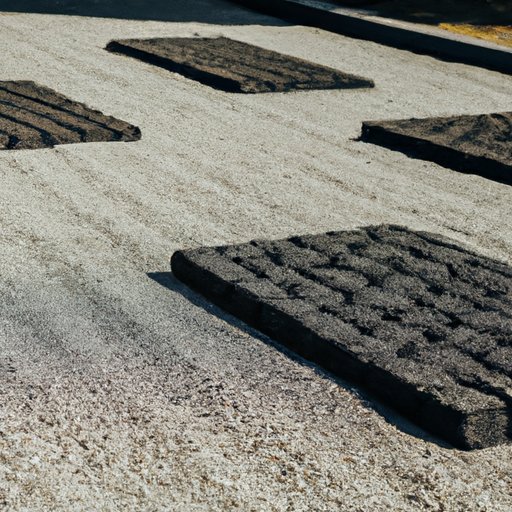Introduction
A paved driveway is a great way to improve the look of your home and add value to your property. But how much does it cost to pave a driveway? In this article, we’ll take an in-depth look at the cost of paving a driveway, from materials and labor costs to factors that will impact the final price.

A Guide to Calculating the Cost of Paving a Driveway
The cost of paving a driveway depends on several factors, including the size and shape of the driveway, the type of paving material used, and local labor costs. To get an accurate estimate of the cost of paving a driveway, you’ll need to consider all these factors.
What materials are needed?
The type of material you choose for your driveway will have a major impact on the cost. Common paving materials include asphalt, concrete, interlocking pavers, and gravel. Asphalt is typically the most affordable option, while pavers tend to be the most expensive. You’ll also need to factor in the cost of any additional materials, such as sand, gravel, and edging.
How much should you expect to pay?
The cost of paving a driveway can vary widely, depending on the size of the driveway, the type of material used, and the complexity of the project. Generally speaking, you can expect to pay anywhere from $4 to $20 per square foot for the materials and labor. For a typical two-car driveway (approximately 500 square feet), that means you could be looking at a total cost of between $2,000 and $10,000.
Tips for getting the best price
When shopping around for the best price, it’s important to compare quotes from multiple contractors. Make sure to ask about any additional fees or charges, such as delivery fees or disposal costs. It’s also a good idea to read reviews and check references before hiring a contractor.

An Overview of Factors that Impact the Price of Paving a Driveway
There are several factors that can affect the cost of paving a driveway. Here’s a look at some of the most common:
Size and shape of driveway
The size and shape of the driveway will have a major impact on the cost of the project. A larger driveway will require more materials and labor, while a more complex shape may require additional work to ensure a smooth, even finish.
Type of paving material used
As mentioned above, the type of material you use for your driveway can have a big impact on the cost. Asphalt is generally the most affordable option, while pavers tend to be the most expensive.
Local labor costs
Labor costs can vary widely depending on where you live. Be sure to shop around for the best price and get multiple quotes from contractors in your area.
Accessibility of the site
If the driveway is difficult to access, it may increase the cost of the project. For example, if the driveway is located on a steep hill, additional equipment may be required to safely complete the job.
Comparing Different Methods of Paving a Driveway
Depending on your budget and preferences, there are several different options for paving a driveway. Here’s a quick comparison of the most popular methods:
Asphalt vs. concrete
Asphalt is generally the most affordable option, while concrete tends to be the most durable. Asphalt requires more maintenance over time, while concrete has a longer lifespan but may crack over time due to ground movement.
Interlocking pavers
Interlocking pavers are a popular choice for driveways because they offer a wide range of design options. They’re also more durable than asphalt or concrete, but tend to be more expensive.
Gravel
Gravel is an inexpensive option for driveways, but it requires more maintenance than other materials. Gravel driveways may not be suitable for areas with heavy traffic.

Exploring the Benefits of Paving a Driveway
In addition to improving the look of your home, there are several other benefits to paving a driveway. Here’s a look at some of the most common:
Improved curb appeal
A paved driveway can instantly boost the curb appeal of your home, making it more attractive to potential buyers. Plus, a well-maintained driveway can make your home stand out from the rest.
Increased property value
A beautifully paved driveway can add value to your property, increasing its resale value. This is especially true if you choose a high-end material like pavers or stamped concrete.
Easier maintenance
A paved driveway is much easier to maintain than a gravel or dirt driveway. With regular cleaning and sealing, you can keep your driveway looking like new for years to come.
Pros & Cons of Paving a Driveway: What You Need to Know
Like any home improvement project, there are both advantages and disadvantages to paving a driveway. Here’s a quick overview of the pros and cons:
Advantages
- Improves the look of your home
- Increases property value
- Easier to maintain than gravel or dirt driveways
Disadvantages
- Costly up-front investment
- Requires periodic maintenance
- May be subject to damage from weather or ground movement
Conclusion
Installing a paved driveway can be a costly investment, but it can also add significant value to your home. Before deciding whether or not to pave your driveway, it’s important to consider all the factors involved, from materials and labor costs to the pros and cons of each type of paving material. With the right planning and preparation, you can enjoy the beauty and convenience of a paved driveway for many years to come.


